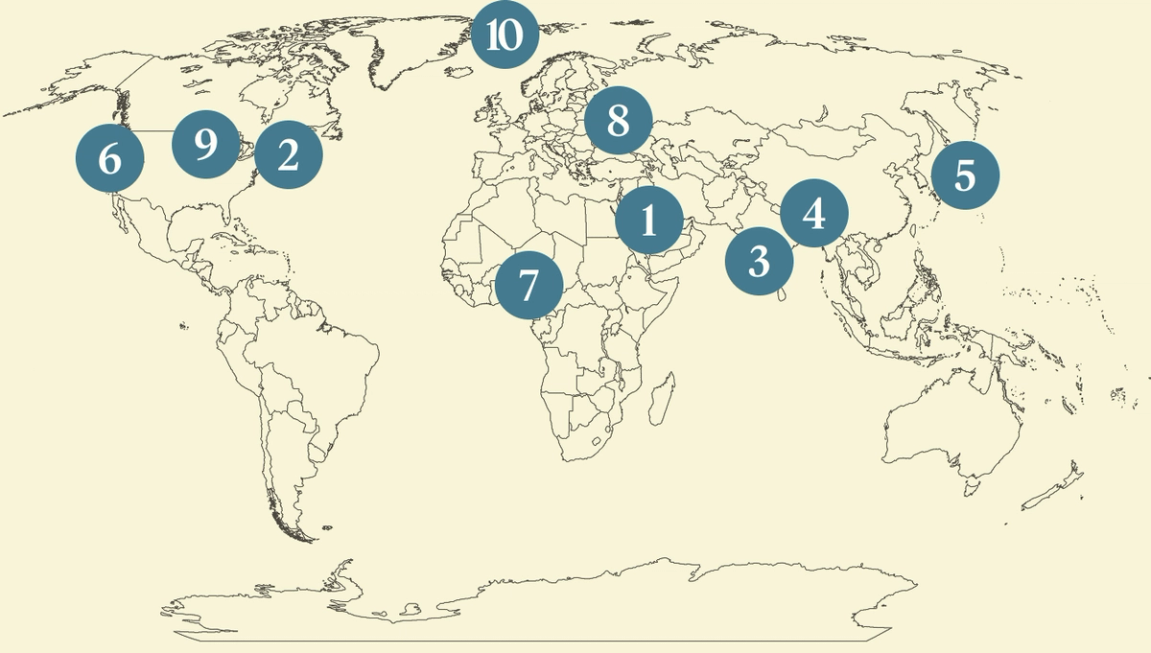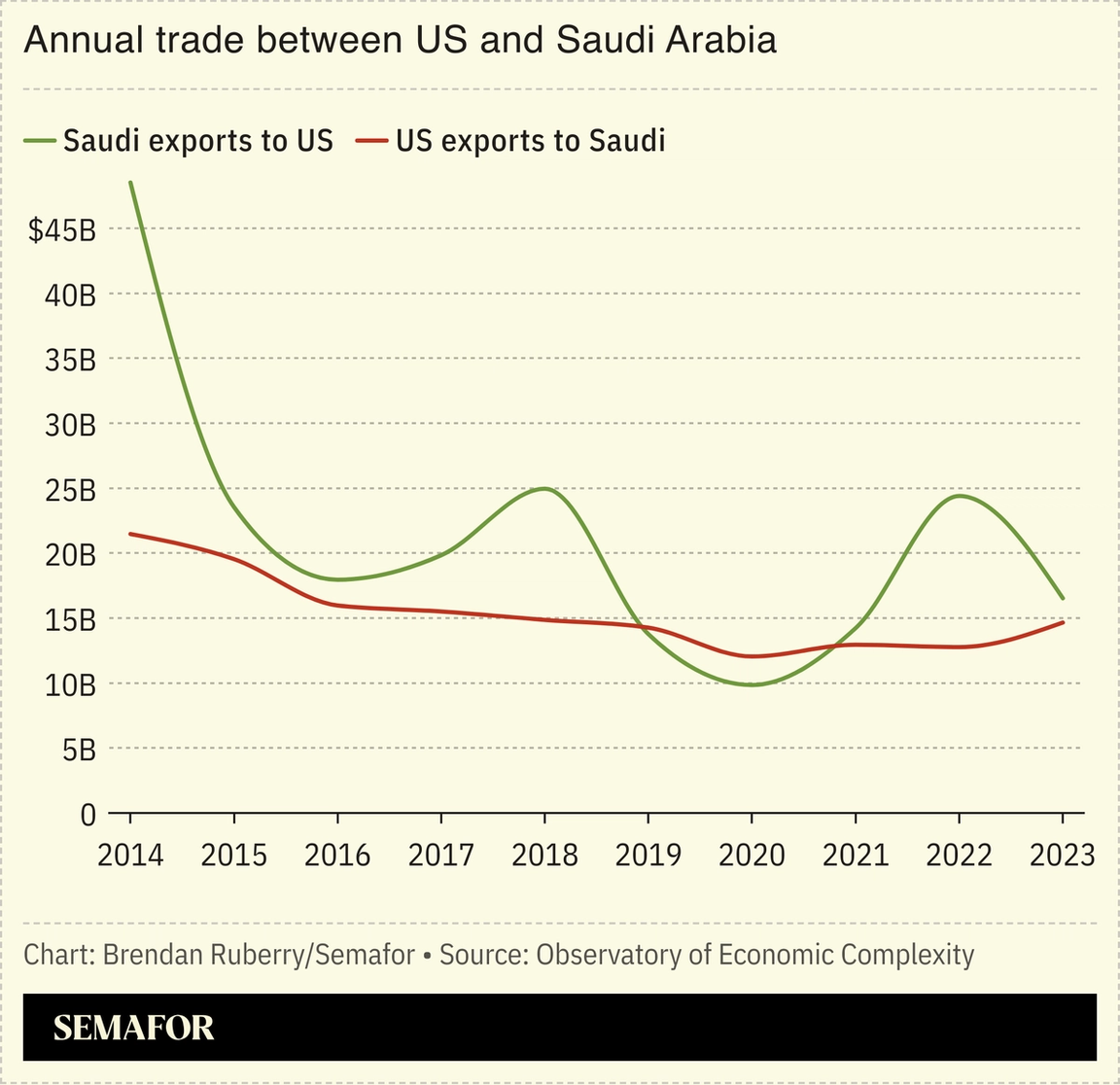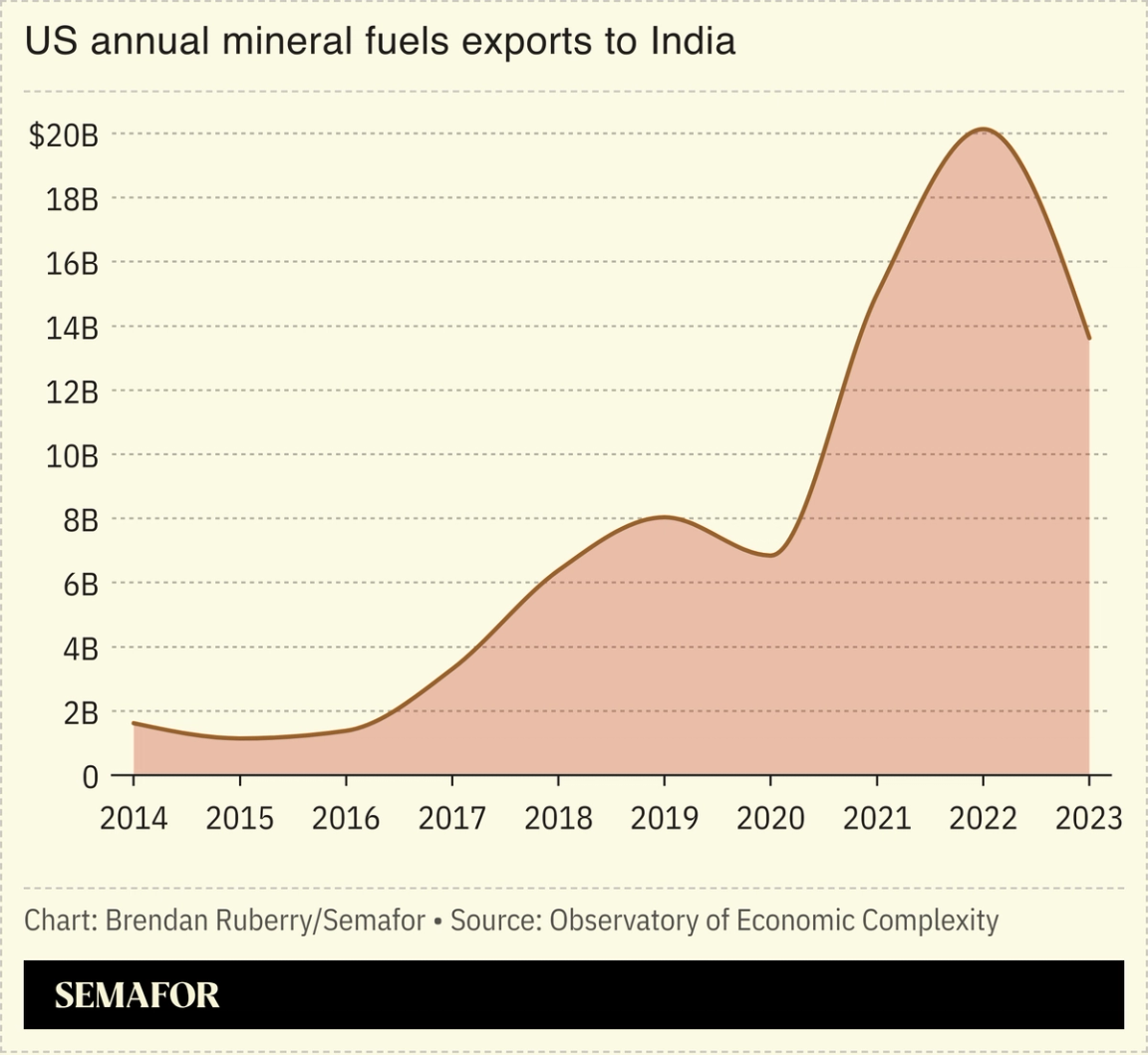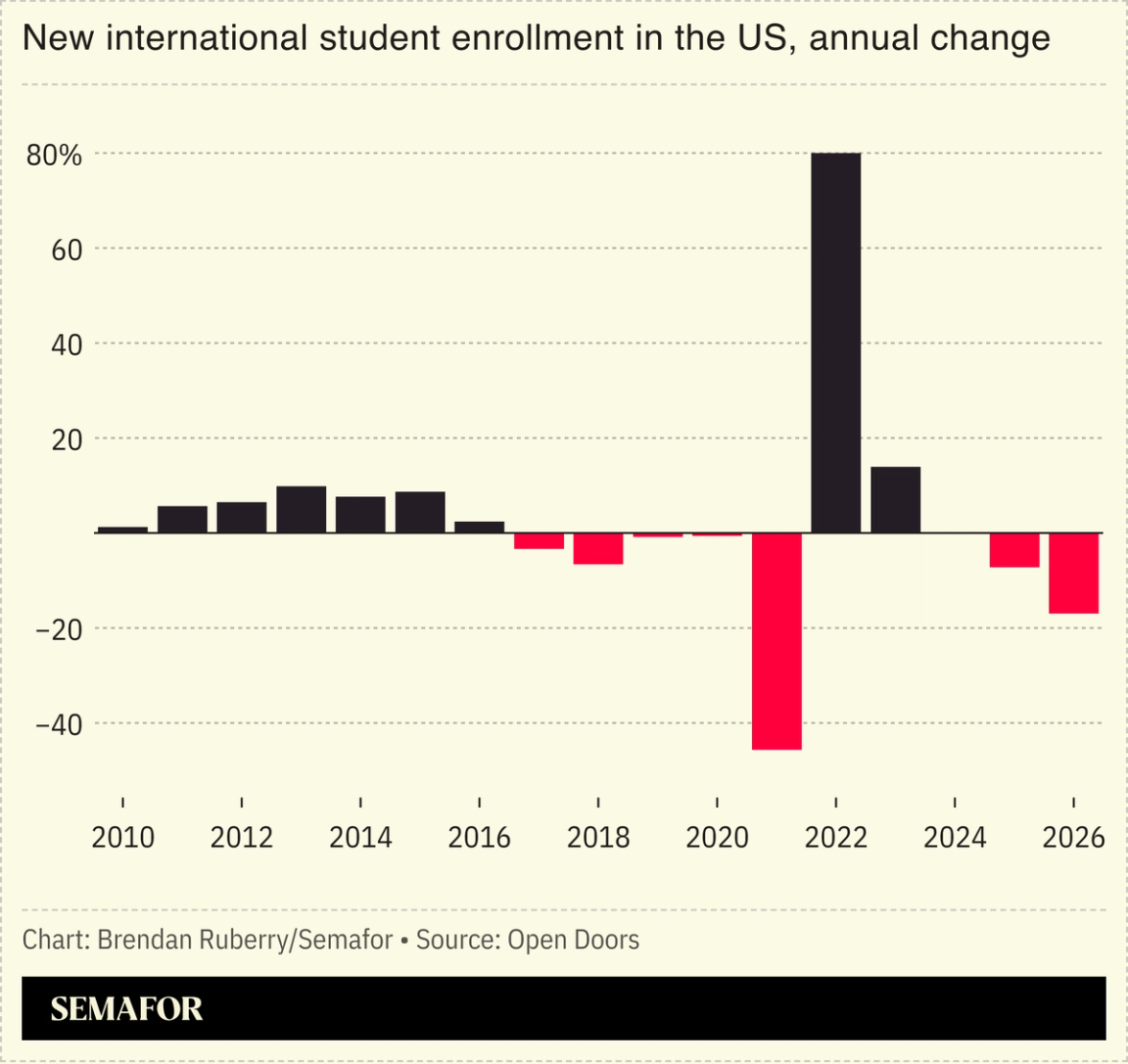| | India strikes an energy deal with the US, Bangladesh’s ousted leader is sentenced to death, and Jeff͏ ͏ ͏ ͏ ͏ ͏ |
| |  | Flagship |  |
| |
|
The World Today |  - MBS’ agenda in DC
- Trump foreign policy scrutiny
- India strikes US energy deal
- Hasina sentenced to death
- Japan-China spat hits markets
- Bezos’ new AI startup
- Africa is buying drones…
- …Ukraine is selling them
- US foreign student enrollment
- Reaching remote Arctic ridge
 A 2,000-year-old statue of an old man is unearthed in Mexico. |
|
Israel, China factor in US-Saudi meeting |
 The Saudi crown prince will likely rebuff US President Donald Trump’s push for Riyadh to normalize relations with Israel during his visit to the White House Tuesday, experts said. After the Gaza conflict, the kingdom has made clear it won’t join the Abraham Accords without Israel’s assurances of a two-state solution. Normalization is high on Trump’s agenda when he hosts Mohammed bin Salman, but the president understands it won’t happen now, a White House official told Politico. “This visit is less about Israel,” a Eurasia Group expert said, and more about Riyadh helping its “most important strategic partner beat China on everything from AI to security, energy, and critical minerals,” Semafor’s Saudi bureau chief wrote. |
|
Trump faces foreign policy pressure |
 Evelyn Hockstein/Reuters Evelyn Hockstein/ReutersUS President Donald Trump is facing rising pressure to square his foreign policy emphasis with domestic concerns. Trump’s second term has been defined by personal, leader-to-leader dealmaking, shunning global institutions and alliances. But his top priorities, from Ukraine to the Middle East, “now require greater buy-in from other countries in order to succeed,” Eurasia Group’s Ian Bremmer wrote in a note: “We’ve passed peak Trump on unilateralism on the global stage.” US conservatives have criticized him for hosting foreign leaders — including the Saudi crown prince — when Americans seemingly care more about affordability. “Why… is a president who was elected to take care of the home-front now bragging (ludicrously) of intervening in eight foreign conflicts?” commentator and Trump critic Andrew Sullivan argued. |
|
India, US strike energy deal |
 India agreed to source nearly 10% of its liquefied petroleum gas from the US, as New Delhi works to finalize its long-awaited trade deal with Washington. Monday’s agreement, which an Indian minister called a “historic first,” will bolster India’s energy security and also mollify the US, The Times of India wrote, after Washington slapped New Delhi with punishing tariffs over its trade surplus and purchases of Russian crude. The deal also helps India diversify its supply of LPG, a key cooking fuel, away from Gulf countries like the UAE and Saudi Arabia, even as New Delhi increases its Middle East crude oil imports following sanctions on Russia. It reflects “the delicate balance India is trying to achieve,” Bloomberg reported. |
|
Ousted Bangladesh PM sentenced to death |
 Sheikh Hasina in 2024. Mohammad Ponir Hossain/Reuters Sheikh Hasina in 2024. Mohammad Ponir Hossain/ReutersA Bangladeshi court sentenced former Prime Minister Sheikh Hasina to death over her government’s deadly crackdown on a student-led uprising that ousted her last year. Hasina, convicted of crimes against humanity, has been in self-exile in India since fleeing Bangladesh more than 14 months ago; Dhaka has called on New Delhi to extradite her, though given her close ties to India, it’s unlikely to do so. The sentence seals Hasina’s downfall — even though she still leads the former ruling party — and could “reshape the country’s political future” ahead of elections scheduled for February, a Bangladeshi journalist wrote. If the next government aggressively pushes for Hasina’s extradition, it could put more pressure on India and its relationship with Dhaka. |
|
China feud weighs on Japan markets |
 Issei Kato/Reuters Issei Kato/ReutersJapanese tourism and retail stocks fell Monday as the country’s diplomatic spat with China weighed on investors. Nearly 500,000 Japan-bound plane tickets on Chinese airlines were canceled after Beijing told citizens to avoid traveling there, the South China Morning Post reported. The row stemmed from the new Japanese premier’s comments about Taiwan; Tokyo dispatched a senior official to China on Monday in a bid to ease tensions. This isn’t a “crisis moment,” FXStreet wrote, but rather a “meaningful reset in Asia’s geopolitical risk premium.” Beijing — which is known to test new, Taiwan-sympathetic leaders — sees a global diplomatic tilt in favor of Taipei and wants to signal that “rhetorical shifts around Taiwan… will be met with economic consequences.” |
|
Bezos to launch, co-lead AI startup |
 Remo Casilli/Reuters Remo Casilli/ReutersJeff Bezos is launching an AI startup that he will spearhead as co-CEO, The New York Times reported. Called Project Prometheus, the company has secured more than $6 billion in funding and plans to focus on tech that “dovetails with Mr. Bezos’ interest in taking people to outer space,” The Times wrote, with AI assisting in engineering and manufacturing across computers and aerospace. The move marks a return to the C-suite for Bezos, who has not held a formal operational role since stepping down as Amazon CEO in 2021. He is jumping into a crowded field, where a growing number of buzzy startups are raising billions to research ways to accelerate AI applications in the physical sciences. |
|
Africa is turning to military drones |
 Francis Kokoroko/Reuters Francis Kokoroko/ReutersAfrican nations are increasingly turning to armed drones both for internal security and military purposes, but their impact is limited. At least 10 African countries have bought the Turkey-made Bayraktar drones, which are relatively cheap and easy to operate, and have demonstrated combat success in the Middle East and Europe. But an academic argued in The Conversation that Africa’s size and the drones’ limited range, plus a lack of trained operators and logistical integration, blunts their effectiveness. One Nigerian drone strike aimed at terrorists killed 85 civilians. Non-state actors in Africa are also acquiring cheap quadcopter drones, Lawfare reported: Armed groups in at least nine African countries have begun using the technology for intelligence and for attacks. |
|
Kyiv looks to export drones |
 Christophe Ena/Pool via Reuters Christophe Ena/Pool via ReutersKyiv is starting to export arms as well as import them. Ukraine builds about 4 million military drones a year; by comparison, the US builds around 100,000. Ukrainian companies need cash, and NATO militaries need technology gleaned from three years of Ukraine’s war with Russia to defend their own airspace. Kyiv is in talks to sell drones to the EU and the US, and Ukrainian companies are building factories in European nations. Necessity has made Ukraine’s defense industry nimble and effective, investors told IEEE Spectrum: It builds things “comparable in quality, more efficiently, smaller, and cheaper.” One manufacturer told Bloomberg that his drones in Ukraine had gone through three generations in the time it took to set up one factory in Finland. |
|
Foreign student enrollment in US falls |
 More foreign students are shunning the US as President Donald Trump makes it increasingly difficult to get a visa, new data showed. New international enrollments fell 17% this year, according to a survey of 825 schools. Of the institutions that reported a decline in foreign students, 96% cited concerns over visa applications; the White House has ramped up pressure on universities as part of a broader immigration crackdown. The total number of international students in the US dropped just 1%, showing that predictions of a mass exodus didn’t materialize, The Economist noted. But “in the long run America’s frosty attitude to foreign students, and rising competition from other countries, is likely to weaken its appeal to top talent from overseas.” |
|
Researchers visit remote Arctic ridge |
Chinese researchers visited one of the most remote and unexplored areas of the planet, an underwater volcanic ridge in the Arctic Ocean. The scientists completed 40 submersible dives to the eastern Gakkel ridge, three miles straight down, gathering specimens for study. Hydrothermal vents on deep-sea volcanic zones are often home to strange ecosystems, and scientists told Nature it could give insight into how life might develop on other worlds, such as Jupiter’s icy moon Europa. China is pushing ahead both in cutting-edge research — it overtook the US in Nature’s national rankings for high-quality science — and in Arctic exploration: Beijing plans an “ice Silk Road” to strengthen its polar presence, despite lacking an Arctic Ocean coast. |
|
|